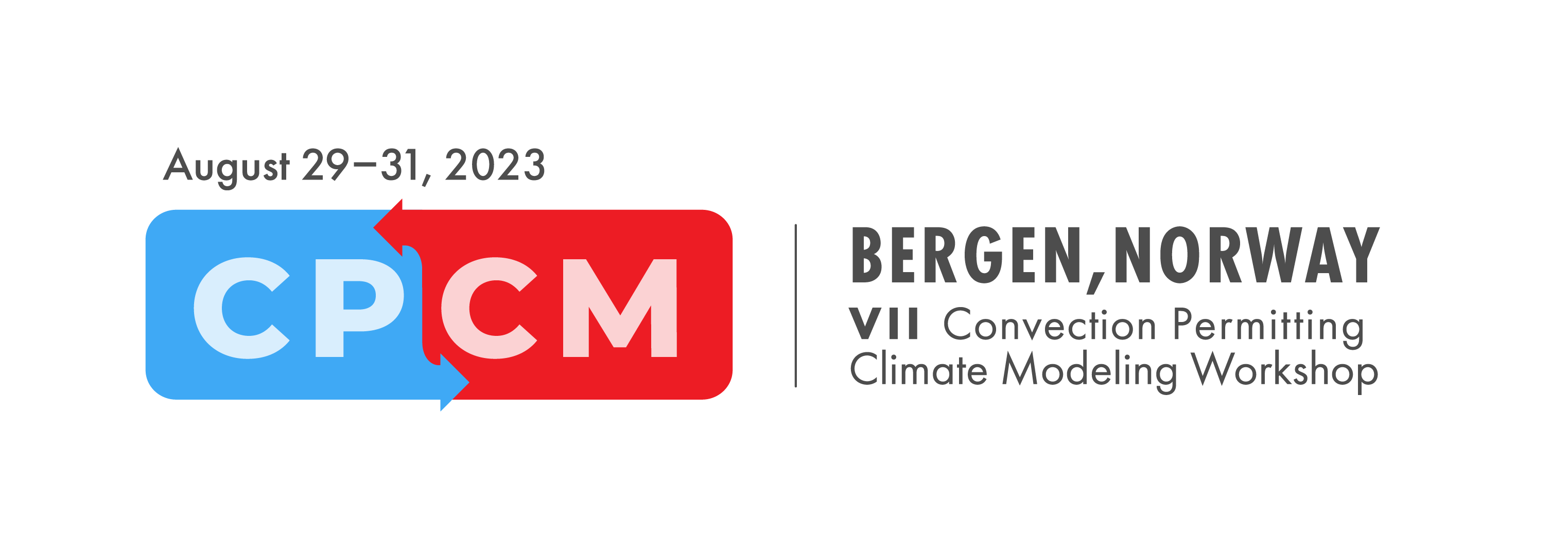DAY 1: TUESDAY 29 AUGUST |
|
|
08:00-09:00 |
REGISTRATION |
|
09:00-09:15 |
WELCOME & INTRODUCTION. S. Sobolowski & A. Prein |
|
PLENARY 1: Mountainous & High-Latitude Regions |
|
|
09:15-09:45 |
Keynote: Convection Permitting to Snow Drift Resolving and Back Again. Ethan Gutmann, NCAR |
|
09:45-10:00 |
First Ensemble of Kilometre-Scale Simulations of a Hydrological Year over the Third Pole. Emily Collier, University of Innsbruck |
|
10:00-10:15 |
Historical and future changes in extreme snowfall in coastal and mountainous areas in Japan. Hiroaki Kawase, Japan Meteorological Agency |
|
10:15-10:30 |
Mechanisms of precipitation in the Peruvian Andes: ENSO and extremes. Emily Potter, University of Sheffield |
|
10:30-11:00 |
COFFEE BREAK |
|
PLENUM 1 (cont.) |
|
|
11:00-11:30 |
Keynote: Land-Atmosphere Interactions at High Northern Latitude. Lena M. Tallaksen, University of Oslo |
|
11:30-11:45 |
Physically based separation of annual maximum precipitation in convection-permitting climate projections. Andreas Dobler, Norwegian Meteorological Institute |
|
11:45-12:00 |
The influence of land cover on rain-on-snow climatology over Norway. Priscilla Mooney, NORCE & Bjerknes Centre for Climate Research |
|
12:00-12:15 |
Do kilometer-scale climate models really perform better over complex topography? Basile Poujol, Sorbonne Université |
|
12:15-13:30 |
LUNCH |
|
PLENARY 2: Extremes & Impacts |
|
|
13:30-14:00 |
Keynote: Using European CPMs and observations to understand changes to weather extremes and their impacts. Hayley Fowler, Newcastle University |
|
14:00-14:15 |
The role of Tibetan Plateau Vortices in extreme precipitation events in the Tibetan Plateau region. Julia Curio, University of Gothenburg |
|
14:15-14:30 |
Analyses of strong wind events in km-scale climate simulations over Germany. Michael Haller, Deutscher Wetterdienst |
|
14:30-14:45 |
Extreme precipitation events during dry years as depicted by the set of FPS-SESA convection-permitting simulations. Maria Laura Bettolli, University of Buenos Aires |
|
14:45-15:00 |
More extreme land surface states contribute to the intensification of organised convection in a convection-permitting climate projection. Conni Klein, UK Centre for Ecology and Hydrology |
|
15:00-15:30 |
COFFEE BREAK |
|
15:30-17:00 |
PANEL DISCUSSION: Mountainous & High-Latitude Regions Nikolina Ban, University of Innsbruck/ Priscilla Mooney, NORCE/ Deliang Chen, University of Gothenburg/ Hiroaki Kawase, Japan Met |
|
17:00-19:00 |
POSTER SESSION & ICEBREAKER Room TEATERGATEN |
|
END of DAY 1 |
|
DAY 2: WEDNESDAY 30 AUGUST |
|
|
08:00 |
REGISTRATION |
|
PLENARY 3: Model Development |
|
|
09:00-09:30 |
Keynote: On the need of a coordinated Convection Permitting regional climate modelling development strategy over the CORDEX domains. Erika Coppola, Abdus Salam Int. Centre for Theoretical Physics |
|
09:30-09:45 |
Progress in Tibetan Plateau Climate System Model (TPCSM) Development. Xiaogang Ma, Tsinghua University |
|
09:45-10:00 |
Exploring land surface interactions in convection-permitting simulations for Europe. Kate Halladay (remote), Met Office Hadley Centre |
|
10:00-10:15 |
How strong is land-atmosphere coupling in global storm-resolving simulations? Junhong Lee, Max Planck Institute for Meteorology |
|
10:15-10:30 |
The ITCZ in convection-resolving climate models. Christoph Schäer, ETH Zurich |
|
10:30-11:00 |
COFFEE BREAK |
|
PLENARY 4: CPCM for Society, adaptation planning and mitigating risks |
|
|
11:00-11:30 |
Keynote: CPM for Society and Managing Risk. Jason Evans, University of New South Wales. |
|
11:30-11:45 |
NUKLEUS – Developing Prototype Services from Convection-Permitting Climate Data. Kevin Sleck, Climate Service Center Germany |
|
11:45-12:00 |
Merging convection permitting modeling results with CMIP6 to produce scenarios for local precipitation extremes for the Netherlands. Geert Lenderink, KNMI |
|
12:00-12:15 |
First Rains: Putting CPMs to the test for S2S onset forecasts. Neil Hart, University of Oxford |
|
12:15-12:30 |
Exploiting new 100y km-scale projections to gain understanding of future changes in local weather extremes. Elizabeth Kendon (remote), Met Office Hadley Center |
|
12:30-13:30 |
LUNCH |
|
13:30-15:00 |
PANEL DISCUSSION: Data access, accessibility, and equitability in CPCM research Nils Wedi (remote), ECMWF/ Christopher Lennard, University of Cape Town/ Jesus Fernandez, CSIC-Universidad de Cantabria/ Eleni Karachaliou (remote), Aristotle University of Thessaloniki |
|
15:00-15:30 |
COFFEE BREAK |
|
15:30-17:00 |
PANEL DISCUSSION: What have we learned from CPCM modelling and what is next? Ruby Leung, PNNL/ Cristopher Schäer, ETH Zurich/ Stefan Sobolowski, NORCE & BCCR/ Andreas Prein, UCB/ Elizabeth Kendon, Met Office (remote) / Alexander Hall (remote), UCLA |
|
17:00-18:00 |
POSTER SESSION |
|
END of DAY 2 |
|
|
19:30-22:30 |
WORKSHOP DINNER Venue: SCANDIC CITY |
DAY 3: THURSDAY 31 AUGUST |
||||
|
BREAKOUT GROUPS |
||||
|
09:00-10:30 |
Room Dragefjellet Group 1:Integration of Earth System and human components Moderator: Klaus Goergen |
Room Muséplass & Strangehagen Group 2: CPCM for society – linking to VIACS and others Moderator: Kevin Sieck |
Room Tårnplass an& Galgebakken Group 3: What should this community prioritize over the next 5 years? Moderator: Erika Coppola |
|
|
10:30-11:00 |
COFFEE BREAK |
|||
|
PLENARY 5 |
||||
|
11:00-11:45 |
Reports from breakout groups |
|||
|
11:45-12:15 |
Motivation for next workshop “Weather-Climate interactions“ Kristen Rasmussen, Colorado State University |
|||
|
12:15-12:30 |
CLOSURE |
|||
|
12:30-13:30 |
LUNCH |
|||
|
13:30-17:00 |
TOUR TO ULRIKEN |
|||
